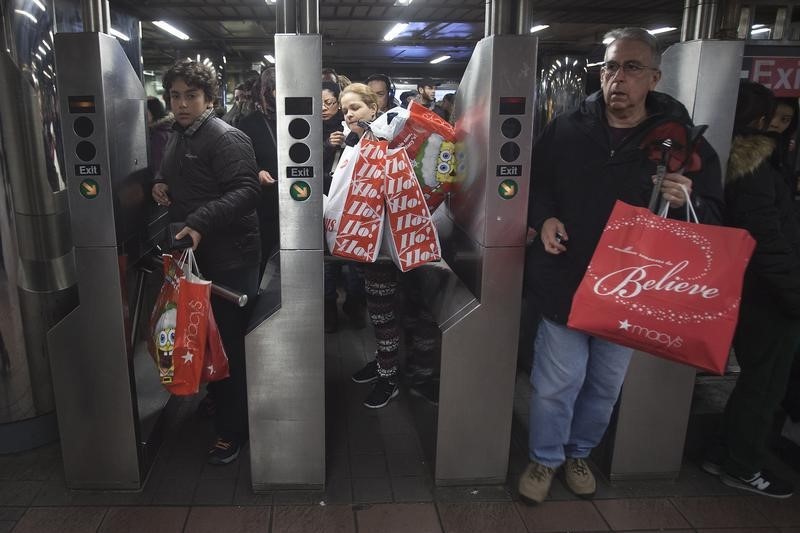By Richard Leong and Michael Connor
NEW YORK (Reuters) - U.S. consumer confidence increased solidly in June, with households upbeat about the labour market, supporting views the economy was back on firmer footing after wobbling at the start of the year.
The rise in confidence came despite moderate increases in gasoline prices. Other data on Tuesday showed house prices rising in April from a year ago and factory activity in the Midwest stabilizing after hitting a 5-1/2-year low in February.
"Consumer spirits are soaring right now showing the economy is on track for further gains this year," said Chris Rupkey,
chief financial economist at MUFG Union Bank in New York.
The Conference Board said its index of consumer attitudes rose to a reading of 101.4 this month from 94.6 in May. The survey showed households growing more bullish about the jobs market. The share of people saying jobs are hard-to-get fell to 25.7 percent from 27.2 percent in May.
The ranks of those viewing jobs as "plentiful" increased to 21.4 percent in June from 20.6 percent the prior month. This supports views of tightening labour market conditions.
The upbeat confidence report was the latest indication that growth was gaining momentum after gross domestic product shrank at a 0.2 percent annual rate in the first quarter, as the economy battled bad weather, port disruptions, a strong dollar and spending cuts in the energy sector.
The report joined bullish data on employment, consumer spending and housing.
U.S. financial markets were little moved by the data as investors braced for a default by Greece on a repayment to the International Monetary Fund. U.S. stocks were trading marginally higher, and the dollar rose against a basket of currencies. Prices for 30-year U.S. government debt rose.
HOUSE PRICE APPRECIATION SLOWING
A second report showed single-family home prices rose in April, but the pace of appreciation appears be slowing, which could ease concerns that rising home values will reduce affordability for first-time buyers.
The S&P/Case Shiller composite index of 20 metropolitan areas in April rose 4.9 percent in April from a year ago. The year-on-year pace of appreciation slowed a bit from 5.0 percent in March.
Denver and San Francisco posted the strongest year-over-year gains, with prices in Denver up 10.3 percent and prices in San Francisco rising 10 percent. Price rises slowed in 11 cities.
"The housing market has essentially recovered. In those areas where home prices moved too far out of line with underlying regional economic fundamentals, the price recovery is likely to continue to fall short," said Steve Blitz, chief economist at ITG Investment Research in New York.
"On a national scale, a more sane allocation of mortgage credit and growth in income and employment are combining to deliver existing home price appreciation generally in line with how much more income consumers have to spend."
The housing market is being bolstered by a tightening labour market, which is helping to spur some pick-up in wage growth.
Manufacturing, which is struggling with the lingering effects of dollar strength and lower energy prices, is starting to stabilise, but it will take a while for activity to pick up.
In a separate report, the Chicago Institute for Supply Management said its Chicago Business Barometer index increased 3.2 points to 49.4 in June, recovering half of May's decline. The index, however, stayed in contraction territory for a second straight month.
Though new orders rose a solid 8.8 percent, pulling back into expansion territory this month, order books continued to shrink. Production contracted further in June, but at a slower pace, and inventories continued to fall.

"With lingering themes of a strong U.S. dollar and tepid demand both at home and overseas, production is likely to remain restrained for some time," said Lindsey Piegza, chief economist at Stifel Fixed Income in Chicago.